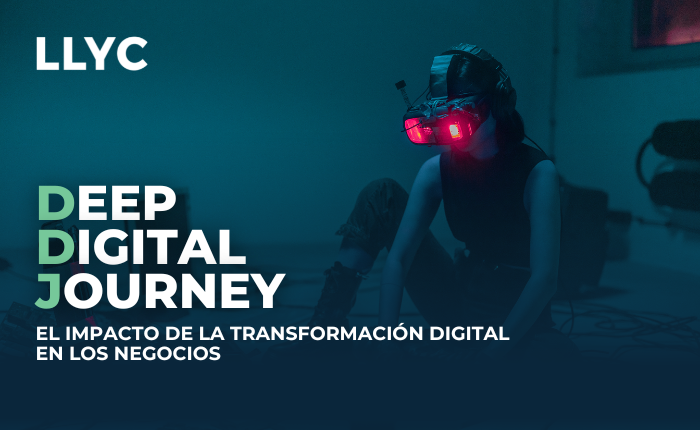The exponential development of new technologies has radically changed the way in which human beings relate to each other and in which organizations interact. In this environment of rapid and constant change, it is essential to understand the role that information and business intelligence play in the decision-making process. The Deep Digital Journey report arises from this need: the impact of digital transformation on business, commissioned by LLYC and conducted by ROI Marketing Institute, which provides a clear picture of the relationship between technology, marketing and communication, and their link to business.
The report is based on surveys of consumers and more than 124 companies in 11 countries where the company is present, divided into two regions: Iberia (Spain and Portugal) and Latam (Argentina, Brazil, Chile, Colombia, Ecuador, Mexico, Panama, Peru and Dominican Republic).
Among its main findings, the study concludes that companies that measure the ROI (return on investment) of their marketing and communication projects and campaigns improve their profitability by almost 31% on average, compared to those that do not. Companies that state that they have business objectives in their marketing and communication plans earn 8.8% more on average than those that do not.
Establishing robust attribution models allows you to determine how much marketing influences consumers’ purchasing decisions and to really know which levers impact your customers in order to make informed business decisions. However, the study reflects that companies are currently still unable to determine how much marketing influences consumers’ purchasing decisions.
Specifically, 50% of the companies surveyed in Iberia and 74% of those surveyed in Latin America still do not use attribution models that allow them to clearly understand how marketing, communication and public affairs impact their business results. Only 9% in Iberia and 12% in Latam reported using return on investment (ROI) as a data type in their monitoring plans.
For Ibo Sanz, Global Tech & Digital Strategist at LLYC and coordinator of the report: “Transformation is a means to an end and not an end in itself, and when this is clear, business results are achieved. To achieve these results we need to work on our culture, real focus on customers or truly agile organizations, with the same focus with which we implement technology.”
“It is imperative that marketing and communications focus their strategy and planning on business results rather than on the execution of activities. Set measurable objectives in real monetary values and monitor performance indicators in terms of costs (or investments), revenues and returns, in addition to the typical audience KPIs we are used to, such as clicks, visits and so on. The latter are marketing inputs but not outputs. The true result of marketing and communication is one that has a real and visible impact on the bottom line, society and the environment,” says Pablo Turletti, CEO of ROI Marketing Institute.
Companies do not focus on the consumer
Digital transformation forces companies to have a greater focus on customers. Customer centricity that arises from consumer experience and perception of the company and its services. However, as the study reflects, there is a significant lack of alignment and consistency between what conditions customers in their purchasing decisions, what companies believe is influential for consumers and where they put their efforts.
While organizations rank websites, social media and Apps as the main channels influencing users’ purchasing decisions, consumers in Latam and Iberia consider recommendations from acquaintances, search engines and social networks as the most important channels and determining factors when deciding on their purchases.
Betting on digital transformation improves results
Another of the study’s conclusions is that the adoption of new technologies that make it possible to understand what the customer thinks, what the customer says and what the customer does through data capture is a determining factor in the profitability of companies.
Specifically, the average profitability of companies that use Big Data solutions to analyze social conversation in digital environments is almost 22% higher than that of companies that do not. The adoption of advanced intelligence solutions to measure the reputation and recommendation level of a given brand is key for companies to make informed decisions that allow them to take improvement measures. This is essential considering that reputation is the second most influential factor in consumers’ purchasing decisions, and recommendations from acquaintances are the second most used and most influential medium.
At the same time, the study also demonstrates how companies that are able to leverage that knowledge by adopting technologies that enable personalization of the user experience achieve better business results: companies that use interfaces powered by artificial intelligence are 57.2% more profitable on average than those that do not; companies that automate campaign generation processes improve their profitability by 12.6%, and companies that have a conversion funnel defined through the use of the company’s digital assets are 15.6% more profitable on average than those that do not.
Cultural transformation, the final pillar
If companies want to provide memorable experiences that contribute to increase their reputation, recommendation and positioning, we need to put the focus on the very functioning of their operations, where we can also observe a lack of internal collaboration and coordination that often influence the success of their business strategies.
In this regard, it is essential to understand the dynamics of each department in relation to the decisions that must be made in marketing and communication. From sharing information to influencing or making decisions on certain aspects of projects and campaigns, all of these interactions are relevant to the success of these departments. However, the study warns that departments other than Marketing and Communications, Sales and General Management are very little involved in these issues.
Specifically, 72.5% of distribution and logistics departments, 20% of general management and 41.9% of IT or technology departments in both regions are not involved in any way with decisions about marketing and communication campaigns.



